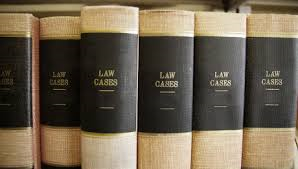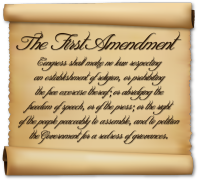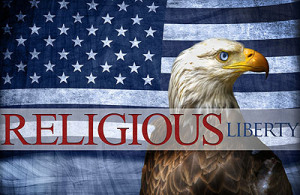We are Catholics and Americans. We are proud to be both, grateful for the gift of faith which is ours as Christian disciples, and grateful for the gift of liberty which is ours as American citizens. To be Catholic and American should mean not having to choose one over the other. Our allegiances are distinct, but they need not be contradictory, and should instead be complementary. That is the teaching of our Catholic faith, which obliges us to work together with fellow citizens for the common good of all who live in this land. That is the vision of our founding fathers and our Constitution, which guarantees citizens of all religious faiths the right to contribute to our common life together.
Over the past several years, we have noticed a shift in certain segments of society towards the Catholic Church. We have seen misrepresentations of our teachings, misunderstanding of our intentions and a gradual erosion of our religious liberty. To address this, last year the US Bishops called for a “Fortnight of Freedom,” a series of days to discuss, pray about and engage our legislature on the topic of religious freedoms.
 Samplings of some of the cases that exemplify the Church’s concern are:
Samplings of some of the cases that exemplify the Church’s concern are:
- The Federal H.H.S. Mandate. The federal government would both force religious institutions to facilitate and fund a product (contraception, sterilization, and abortion-inducing drugs) contrary to their own moral teaching and purport to define which religious institutions are “religious enough” to merit protection of their religious liberty.
- State Immigration Laws (Alabama). Several states have passed laws forbidding what the government deems “harboring” of undocumented immigrants but which the Church deems Christian charity and pastoral care to those immigrants.
- Altering Church Structure and Governance (Connecticut). Legislature proposed a bill that would have forced Catholic parishes to be restructured according to the governments guidelines and to redefine for the Church what a “religious minister” and a “religious employer” would be.
- Christian Students on Campus (University of California - Hastings College of Law) Denied a student organization status because it (a “Christian” group) required its leaders to be Christian and to abstain from sexual activity outside of marriage.
- Catholic Foster Care / Adoption Services (Boston, San Francisco, the District of Columbia, State of Illinois) By revoking their licenses, by ending their government contracts, or both, legislature has forced local Catholic Charities to close their adoption/foster care services because those Charities refused to place children with same-sex couples or unmarried opposite-sex couples who cohabit.
- Discrimination against Catholic Humanitarian Services. (Federal Government) The federal government changed its contract specifications to require the Catholic Bishops’ Migration and Refugee Services, in their services for victims of human trafficking, to provide/refer for contraceptive and abortion services in violation of Catholic teaching. Ironically, government services were deemed to be inferior of government guidelines while Catholic services met/exceeded government guidelines.
What is the First Amendment?
“Congress shall make no law respecting an establishment of religion, or prohibiting the free exercise thereof; or abridging the freedom of speech, or of the press; or the right of the people peaceably to assemble, and to petition the Government for a redress of grievances.”

Two items are of note. The first is the “Establishment Clause,” (“shall make no law respecting an establishment of religion”) this prohibits Congress’ from establishing a national religion or interfering with the established religions of the states. In recent years, this has also been interpreted in forbidding direct government funding of religion and religious activities/services.
The second is the “Free Exercise Clause” (“prohibiting the free exercise thereof”). This phrase generally protects citizens and institutions from government interference with the exercise of their religious beliefs. It sometimes mandates the accommodation of religious practices when such practices conflict with federal, state, or local laws.
Religious Liberty - More Than Just Freedom of Worship
 Certain voices in the government and society would hold that religion is strictly a “private” matter and has no place in the public square. The Catholic Church has eschewed this idea for centuries. Religious liberty is not only about our ability to go to Mass on Sunday or pray at home. It is about whether consciences Catholics, and ANY person of faith, has a voice in the “marketplace of ideas” and can make a contribution to the common good of all Americans. Religious freedom means that we can do the good works our faith calls us to do, without having to compromise that very same faith. Without religious liberty properly understood, all Americans suffer and are deprived of the essential contributions that the Catholic Church in particular, for hundreds of years, has provided in education, health care, feeding the hungry, civil rights, and social services that religious Americans make every day, both here at home and overseas.
Certain voices in the government and society would hold that religion is strictly a “private” matter and has no place in the public square. The Catholic Church has eschewed this idea for centuries. Religious liberty is not only about our ability to go to Mass on Sunday or pray at home. It is about whether consciences Catholics, and ANY person of faith, has a voice in the “marketplace of ideas” and can make a contribution to the common good of all Americans. Religious freedom means that we can do the good works our faith calls us to do, without having to compromise that very same faith. Without religious liberty properly understood, all Americans suffer and are deprived of the essential contributions that the Catholic Church in particular, for hundreds of years, has provided in education, health care, feeding the hungry, civil rights, and social services that religious Americans make every day, both here at home and overseas.
What is at stake is whether America will continue to have a free, creative, and robust civil society—or whether the state alone will determine who gets to contribute to the common good, and how they get to do it.